Large animal masses
Cysts
Cysts are typically congenital and caused by the lack of development of a normal opening that would allow fluid to drain. They can be caused by repeated trauma and are the body’s means of trying to create padding. Cysts are often fluctuant (water balloon partially filled up) but can be quite turgid or firm. Needle aspiration usually results in a clear, nonodorous fluid that is mostly acellular. Ultrasound should show a clear fluid enclosed in a thin walled capsule.
![]()
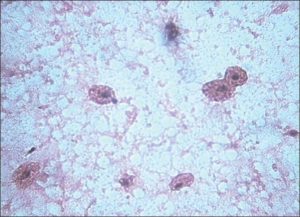
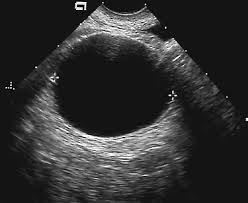
Aspiration is usually not curative as the fluid redevelops over time. Formalin is commonly used in non-food animal species to stop the fluid production. The fluid in the cyst is removed and an equal volume of 10% neutral buffered formalin injected. The formalin can be re-aspirated after 5 min if desired. The formalin destroys the cells producing the fluid. If the cyst does not respond, is in a food animal, or is in an area that isn’t easily injected, it can be removed surgically. It is important to remove the lining to prevent recurrence.
LA cysts
Goats can have wattle cysts. These are branchial cleft cysts, are benign and do not need removal.
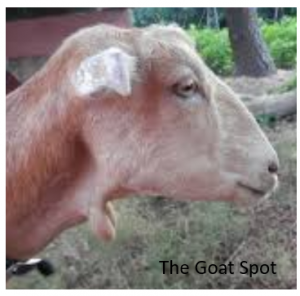
Horses can be born with nasal epidermal inclusion cysts (atheromas). These are small cysts in the false nostril. These respond well to injection of formalin. The cyst desiccates and dries up/falls out in 2 weeks.
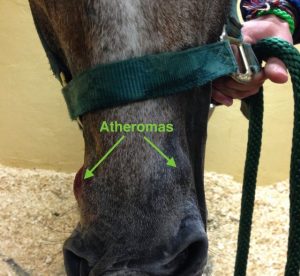
Horses can have ectopic teeth that lead to draining wounds near the ear – these are known as dentigerous cysts. Removal can be tricky as the tooth can be solidly attached to the skull.
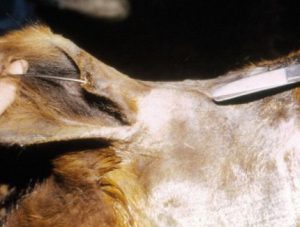
Key Takeaways
Cysts are fluctuant, nonpainful and do not cause fevers.
- Ignore
- Treat with formalin injection
- Remove
Resources
Dentigerous cysts in horses: A retrospective study. Equine Vet Educ. 2025;37:427–434. – good pics
Common questions from goat producers – DVM360 lumps and bumps
A diagnostic approach to congenital neck masses in foals– Equine vet. Educ. (2022) 34 (5) 231-234
a congenital abnormality that arises from the first through fourth
pharyngeal pouches

